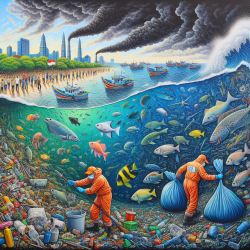Understanding the Impact of Marine Pollution on Fish Consumption
Marine pollution is a growing concern globally, and Indonesia is no exception. As the world's second-largest fish producer, Indonesia faces the challenge of promoting fish consumption while battling high levels of marine pollution. A recent study titled Fish—To Eat or Not to Eat? A Mixed-Methods Investigation of the Conundrum of Fish Consumption in the Context of Marine Pollution in Indonesia explores this complex issue using a mixed-methods approach.
Key Findings from the Study
The study utilized both quantitative and qualitative methods to assess fish consumption patterns and the impact of marine pollution on fish quality and availability. Here are some key findings:
- Fish is the most frequently consumed animal-source food in Indonesia, with older adults consuming more fish than younger individuals.
- Marine pollution, particularly in the Java region, negatively impacts fish availability and quality, leading to lower consumption levels.
- Awareness of marine pollution is generally low among Indonesians, but those with higher education levels tend to be more aware and cautious about fish consumption.
- Key informants highlighted the role of urbanization and nutritional transition in exacerbating marine pollution.
Implications for Practitioners
For practitioners, these findings underscore the importance of integrating environmental awareness into dietary recommendations. Here are some practical steps:
- Educate communities about the impact of marine pollution on fish quality and the importance of sustainable fishing practices.
- Promote awareness campaigns that highlight the benefits of fish consumption while addressing pollution concerns.
- Collaborate with policymakers to develop strategies that reduce pollution and support sustainable fishery practices.
Encouraging Further Research
The study suggests that more research is needed to fully understand the intersection of fish consumption and marine pollution. Practitioners are encouraged to engage in or support research initiatives that explore:
- The long-term health impacts of consuming fish from polluted waters.
- Effective interventions to increase public awareness and promote behavioral change.
- Policy measures that balance the promotion of fish consumption with environmental sustainability.
By staying informed and proactive, practitioners can play a crucial role in improving public health outcomes and ensuring a sustainable future for Indonesia's marine resources.
To read the original research paper, please follow this link: Fish—To Eat or Not to Eat? A Mixed-Methods Investigation of the Conundrum of Fish Consumption in the Context of Marine Pollution in Indonesia.










